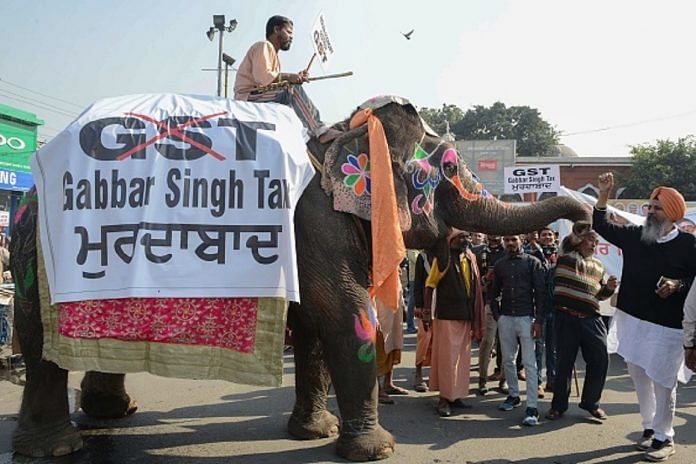Constantly making changes to policies like GST shows that a government is responsive and open to course-correction, despite what critics say.
Various experts in the pundit-republic of India have told us with supreme élan and wit that the frequent flip-flops with respect to our newest tax, the Goods and Services Tax (GST), show the government in a bad light. I beg to disagree.
Many readers of this splendid digital journal may have very little acquaintance with something that was quaintly called the Permit/Licence Raj. This writer spent two decades of his business career on the morning Indian Airlines (there was no other airline) flight from Bombay (as it was then called) to Delhi with the sole objective of meeting various bureaucratic chieftains, who laid down the law to us poor benighted businessmen.
And let me tell you from experience that frequent and speedy flip-flops are good. As the good Scotsman Robert Louis Stevenson said in a different context, “I remember it as if it were yesterday…”
There was a meeting with an exalted joint secretary of the exalted DGTD/JCCIE/CBDT Department. He had kept us sweaty Bombay businessmen waiting for a mere two hours. He told us that he agreed that the most recent ‘ukase’ (a Russian decree) issued by his department, while ostensibly in the interests of India’s teeming ‘gareebs’, was actually disastrous for the country.
We were all pleasantly surprised that the honourable joint secretary actually agreed that the latest circular from his exalted department was counter-productive in the extreme. We assumed that he would, therefore, withdraw the offending regulation the same day.
Ay, there was the rub.
He went on to explain to us ‘uneducated’ and ‘uncouth’ businessmen that the government of India had “procedures”, and under these exalted procedures, it would take a minimum of two years to reverse a decision, which everyone knew was patently bad, unworkable and, need I add, anti-national.
So, we lived with that disastrous regulation actually for three years, as procedures for retraction had become even more cumbersome. And we lost a few percentage points of growth as compared to the Koreas and Taiwans of the world at that time. But that was a small price to pay in order to prove the point that the government of India will not give in to “speedy flip-flops”. In those days, the government of India could never admit quickly that one of its laws was a mistake. If ever that was admitted, it would be only after a few years.
Here are some examples of the decisions we wrestled with back then: prohibited the gifting of free computers from a foreign country (or by a foreigner) to an Indian education institution; raising the duty on air-conditioners, which adversely affected production and government revenue; import duty on software.
Add to these illogical decisions a measure of frustrating inflexibility.
It is to the credit of Prime Minister Narendra Modi’s government that it has not adopted an inappropriate macho stance, arguing that an erroneous decision needs to be defended for two years or more. Au contraire, it is the strong leader who has the courage, the wisdom, the grace and the humility to make changes (call them “flip-flops” if you wish) as soon as it becomes obvious to Mumbai businesspersons and to exalted Delhi nobles that yesterday’s decision was not in the country’s interest.
Rather than indulging in shallow criticism of the alacrity with which GST rates/slabs/categories/processes have been changed, one should feel happy that at last we have a government that is modern in the best sense of the word. A modern government is one that is open to constructive feedback (especially from businesspersons who, at the end of the day, contribute to the essential economic activity of the country). It does not get paralysed on account of inflexible procedures; it does not fear being accused of flip-flops, and it sensibly, efficiently, and above all, quickly, makes the necessary course-corrections.
While the honourable joint secretaries of yesteryears have left us with the unfortunate legacy that we have fallen way behind Korea and Taiwan, the new regime of bold, sensitive and quick flip-flops is likely to ensure that we do not fall further behind, and with some luck, we might actually catch up.
With every new reform that is put in place, I look forward to flip-flops in order to fine-tune matters and stay on course. I regard these as strong, sensible responses to feedback—not as a sign of weakness at all.
Jaithirth Rao is an entrepreneur and a writer.



